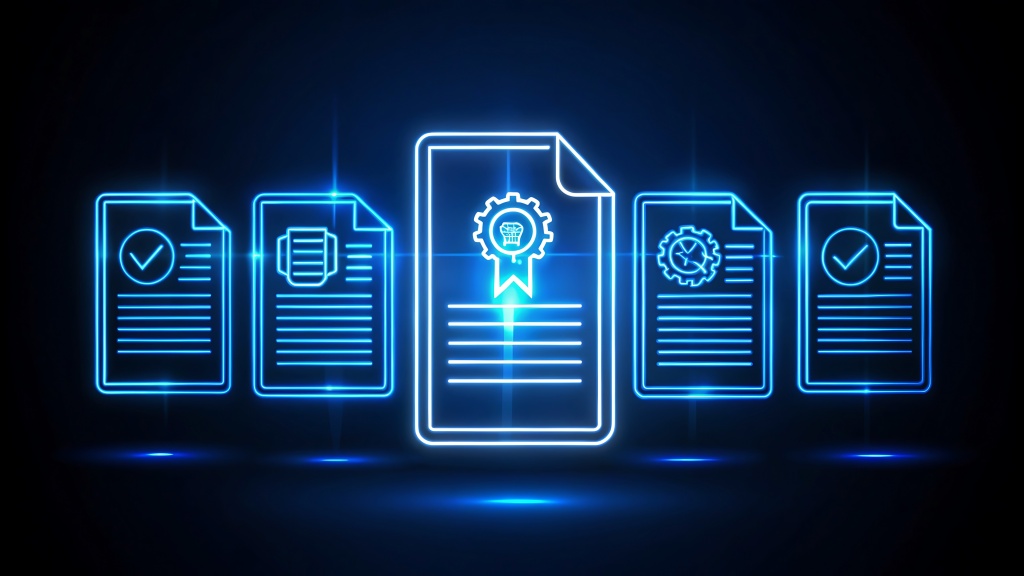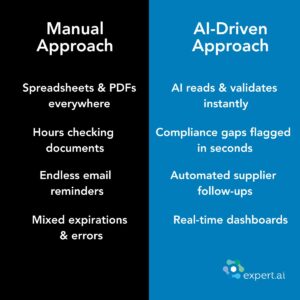
30 July 2025
Why Modern Compliance Needs AI
Managing Supplier Risks with Confidence
Today, compliance isn’t just a regulatory hurdle. It’s become a powerful lever for brand trust, market access and operational resilience. From quality and environmental standards to data security and labor practices, certifications and audits are now central to how organizations prove their commitments to customers, partners, regulators and investors alike. Yet as the stakes rise, so does the complexity. Companies are managing growing webs of requirements across dozens of standards, jurisdictions and supply chain partners. For many compliance teams, this means living in a daily world of spreadsheets, PDFs, email chains and constant deadline anxiety. It’s a landscape crying out for smarter solutions.The New Reality: More Certifications, More Suppliers, More Risk
Consider how quickly the compliance landscape is evolving. Organizations now routinely pursue certifications like ISO 9001 (quality), ISO 14001 (environmental), ISO 45001 (occupational health & safety) and a host of industry-specific or ESG-driven frameworks. But it doesn’t stop at the organization’s four walls. Compliance increasingly means monitoring suppliers and third parties. After all, one lapse by a vendor—an expired certificate, an overlooked standard—can ripple through the value chain, leading to serious operational disruptions or reputation damage. According to a Gartner survey, 45% of organizations have experienced business interruptions related to third parties over the past two years. Yet, a Deloitte survey indicates that many companies lack the visibility they need: fewer than half said they have formal monitoring mechanisms in place to detect changes in ESG-related risks, for example. The message is clear: compliance is about protecting the entire business.Why Manual Methods Can’t Keep Up
Despite these rising stakes, many compliance and procurement teams still rely on surprisingly manual methods to track certifications and supplier risk:- Spreadsheets to list supplier names, certificate types and expiration dates
- Shared folders filled with static PDFs
- Staff manually opening documents, cross-checking requirements and sending reminders

The Promise of AI-Powered Compliance
The good news? Advances in artificial intelligence are transforming what’s possible. New compliance intelligence solutions can automatically:- Read and extract data from supplier certifications and documents, in seconds.
- Validate that documentation meets specific regulatory and internal standards, flagging any gaps immediately.
- Track expiration dates and proactively engage suppliers, sending automated reminders well before critical deadlines.
- Trigger workflows to suspend accreditations or initiate remediation plans when compliance falls short.
- Provide real-time dashboards, giving compliance teams complete visibility across supplier networks.
The Power of Partnership: expert.ai and Cegeka
That’s exactly why companies like expert.ai and Cegeka have partnered: to put AI at the heart of compliance and supplier risk monitoring. Cegeka’s WEMAIND™ platform, a robust business process automation solution, now integrates an advanced compliance intelligence agent powered by expert.ai’s EidenAI Suite. This isn’t just technology for technology’s sake, it’s designed to directly address the pain points that compliance leaders face every day. Here’s how it changes the game:- Automated document analysis: When suppliers upload certifications, the AI reads them instantly, extracts key compliance data, and checks them against regulatory and internal requirements.
- Proactive supplier engagement: The system knows when certifications are nearing expiration and automatically reminds suppliers, reducing back and forth.
- Integrated workflows: If a document is missing or non-compliant, the system can suspend accreditations or trigger corrective actions without manual intervention.
- Real-time dashboards: Customers get a live, comprehensive view of certification and supplier compliance status, dramatically reducing prep time for audits and improving customer confidence.
- Faster supplier onboarding and renewals, with fewer bottlenecks.
- Lower risk of fines, lost contracts or reputational damage.
- Significant cost savings and efficiency gains.
- Freed-up team capacity for higher-value, strategic work.










